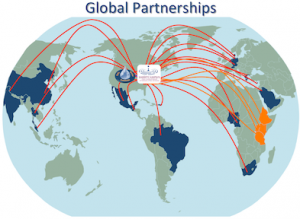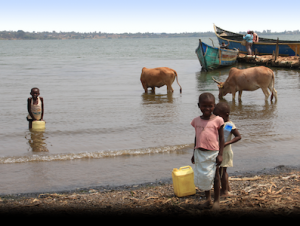About Us
 Safe Global Water Institute (SGWI) is a consortium of global centers of excellence in research, education, and regional stakeholders working across the boundaries of Water & Sanitation with Health, Food, and Energy. United, we are working to overcome the basic science, engineering solutions, educational capacity, and socio-economic barriers to providing sustainable safe water and sanitation to the peoples of the world.
Safe Global Water Institute (SGWI) is a consortium of global centers of excellence in research, education, and regional stakeholders working across the boundaries of Water & Sanitation with Health, Food, and Energy. United, we are working to overcome the basic science, engineering solutions, educational capacity, and socio-economic barriers to providing sustainable safe water and sanitation to the peoples of the world.
At the core of the SGWI, is the Center of Advanced Materials for the Purification of Water with Systems (WaterCAMPWS), part of the National Science Foundation’s premier Science and Technology Centers program. For over ten years, the WaterCAMPWS has been a world leader in the water purification sciences with research collaborations in the United States and international partnerships in over 20 countries. SGWI is the transformation of these global partnerships into a focused consortium that can address the full spectrum of safe water and sanitation needs from advancing science and engineering in state-of-the-art facilities, to implementation of new solutions in target rural communities, and to increasing the global human capacity to ensure long-term sustainability of new technologies. SGWI is looking to expand its mutually beneficial partnerships along the whole value chain from invention and implementation to long-term sustainability.
Vision
A “cell phone” like revolution is needed to overcome severe hunger, malnutrition, and health degradation, conditions directly linked to the lack of access to safe water (more than 1 in 10 people in the world) and safe sanitation (~3 in 10 people). SGWI was founded on the belief that the innovative and distributed systems that will solve the challenges most impacting rural areas today will also be the solutions for the major cities of the world as their centralized water and sanitation infrastructure begin to fail within the next few decades.
Working united, SGWI is:
- creating novel sustainable disinfection and toxic chemical treatment systems for safe water and sanitation
- developing novel sustainable sanitation systems that turn waste from a burden to a valued resource
- optimizing novel sustainable sanitation systems to generate energy for home power supply and recover nutrients for food security and nutrition
- making robust integrated systems to ensure the resiliency against severe weather events from climate change variability
- implementing an integrated social-physical science framework to support the implementation and maintenance of engineering solutions and their management
- test-bedding model systems in target communities to implement the emerging technical solutions, educational programs, and micro-financing/market literacy systems
Global Water & Sanitation Challenge
 The UN Millennium Development Goal is to reduce by half the portion of people without access to “safe” water and improved sanitation by 2015. Currently, more than ten percent (~800 million people) of the world’s population still lacks access to “improved” water, many hundreds of millions more drink “unsafe” water from “improved” sources, and roughly 2.5 billion people lack access to improved sanitation. These are the very same people that are at the bottom of the global economy, people whose livelihood is frequently undercut with morbidity (4 billion annual episodes of diarrhea) and mortality (2 million annual deaths) from waterborne-related diseases.
The UN Millennium Development Goal is to reduce by half the portion of people without access to “safe” water and improved sanitation by 2015. Currently, more than ten percent (~800 million people) of the world’s population still lacks access to “improved” water, many hundreds of millions more drink “unsafe” water from “improved” sources, and roughly 2.5 billion people lack access to improved sanitation. These are the very same people that are at the bottom of the global economy, people whose livelihood is frequently undercut with morbidity (4 billion annual episodes of diarrhea) and mortality (2 million annual deaths) from waterborne-related diseases.
Water is central to the contributing factors of these deaths. Contamination of drinking water with pathogens, pesticides, toxins and other caustic elements causes malnutrition of children; poor health care of pregnant mothers and neonates; co-infections with other bacteria or viruses that may increase severity of disease; transmission of zoonotic infections from agricultural animals and wild animals. In addition, scarcity of water destabilizes the socio-economic stability of families and communities.
Compounding these challenges are the struggles of African universities to expand and produce high quality students to address these problems because of factors such as insufficient funding, lack of highly qualified faculty, and retention of high quality students. Unresolved, these water, sanitation, and higher education problems negatively impacts local and global economies and political stability.
The Safe Global Water Institute (SGWI) is working to overcome these challenges by leveraging the skills and expertise of a consortium of global centers of excellence in research, education, and regional stakeholders collectively work across the boundaries of Water & Sanitation with Health, Food, and Energy. The SGWI is founded on the premise that using transdisciplinary research/academics focused on increasing the capacity of regional universities to produce local researchers, scientists, and skilled workers is the critical step needed to ensure long-term solutions for improving access to safe water and improved sanitation in the developing word.
Faculty and Staff
| [image] | Benito J. Mariñas, Ph.D. Director, SGWI Ivan Racheff Endowed Professor, and Interim Head, Civil and Environmental Engineering University of Illinois Phone: (217) 333-6961 Email: marinas@illinois.edu |
[image] | Brian M. Pianfetti, Jr., Ph.D. Managing Director, SGWI Civil and Environmental Engineering University of Illinois Phone: 217-244-6979 Email: bpianfet@illinois.edu |
| [image] | Joanna L. Shisler, Ph.D. Associate Director of Water & Health Research, SGWI Associate Professor of Microbiology Molecular and Cellular Biology University of Illinois Phone: 217-265-6450 Email: jshisler@illinois.edu |
[image] | Vicki A. Dixon Director of Development, SGWI Civil and Environmental Engineering University of Illinois Phone: 217-244-0857 Email: vdixon@illinois.edu |
| [image] | Michael J. Plewa, Ph.D. Education Director, SGWI Emeritus Professor of Genetics University of Illinois Phone: 217-333-3614 Email: mplewa@illinois.edu |
[image] | Peter Francis Luswata Uganda Director, SGWI Director, Uganda Rural Community Support Foundation Kampala, Uganda Phone: +256-772-976997 Email: pfluswata@gmail.com |
| [image] | Jeremy S. Guest, Ph.D. Thrust Leader for Sanitation and Resource Recovery, SGWI Assistant Professor, Civil and Environmental Engineering University of Illinois Phone: 217-244-9247 Email: jsguest@illinois.edu |